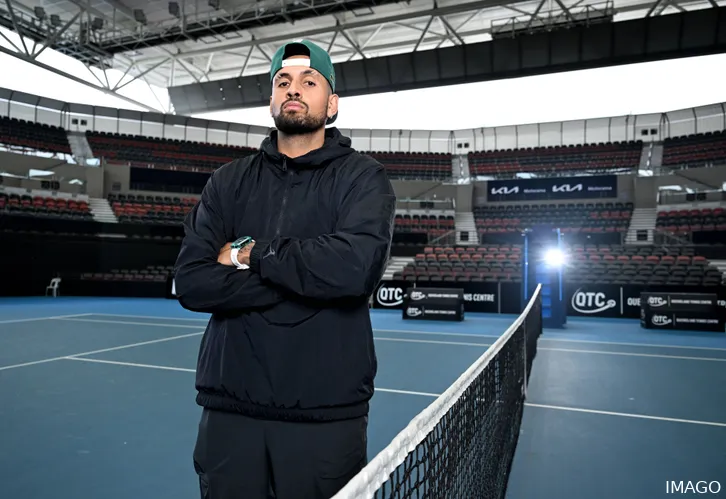
Nick Kyrgios, known for his outspoken nature, recently aligned himself with former tennis champion Yevgeny Kafelnikov in a heated discussion about doping controversies in tennis. The debate intensified following the announcement that Iga Świątek, the current WTA World No. 2, had tested positive for the banned substance trimetazidine. Świątek accepted a one-month suspension after proving there was no intentional wrongdoing on her part, drawing parallels to a similar case involving Jannik Sinner earlier in the year.
The Context of Świątek’s Case
Świątek’s positive test for trimetazidine—a heart medication banned due to its potential performance-enhancing effects—sparked widespread concern and debate within the tennis community. She successfully demonstrated that the substance entered her system unintentionally, likely through contaminated melatonin supplements used to combat jet lag. As a result, the International Tennis Integrity Agency (ITIA) imposed a relatively lenient one-month suspension, which many viewed as a fair outcome given the circumstances.
However, the case ignited fierce discussions about the broader implications of doping incidents in tennis. Kafelnikov, a two-time Grand Slam champion and former World No. 1, did not mince words in expressing his discontent. Taking to social media, he questioned the state of modern tennis and the message being sent to younger generations.
Kafelnikov’s Strong Stance
In his initial post, Kafelnikov lamented the perceived leniency in doping cases today compared to the past. “Sometimes I wonder… ‘Why the hell was I not using steroids throughout my career, so I could play 300 matches a year instead of 170?’ This is really a shame, what’s happening to tennis now,” he wrote, expressing frustration that such incidents could undermine the integrity of the sport. His comments struck a chord with many fans and fellow players, including Kyrgios, who reposted the statement to his own social media channels, implicitly endorsing Kafelnikov’s perspective.
The Russian tennis legend did not stop there. He elaborated on the potential long-term impact of such cases, particularly on young players aspiring to join the professional ranks. “The sad part to all of this is that young and upcoming players (12–16 years old) look at their idols and think maybe it’s normal to use steroids in the future and get away with it! Current players are setting bad examples for younger generations,” Kafelnikov warned. This statement underscored a broader concern: the possibility that inadvertent doping cases might normalize or trivialize the issue in the eyes of impressionable young athletes.
Defending Świątek: A Divided Response
Not everyone agreed with Kafelnikov’s harsh assessment. One fan responded, defending Świątek by pointing out that her case highlighted the complexities of modern anti-doping regulations. “Young players will learn that even without doping, they may fail a test due to inadvertent contamination but will be able to prove in court that it was just an accident. However, there will always be haters, fans of rivals, and old tennis players,” the fan wrote. This view reflects a growing sentiment among some fans and players that the anti-doping system, while necessary, can sometimes penalize athletes unfairly for unintentional infractions.
Kafelnikov, however, remained unconvinced. He fired back with a call for zero tolerance. “This is not true!! Nobody will fail a test unless you purposely use a banned substance,” he insisted. His position is clear: any positive test result, regardless of the circumstances, should lead to severe consequences. “It should be a LIFE ban for anybody who gets caught using banned substances! NO excuses and ZERO tolerance, no matter who you are!!!!” he declared emphatically.
Nick Kyrgios Joins the Conversation
Nick Kyrgios, never one to shy away from controversy, lent his voice to the debate by sharing Kafelnikov’s posts. While Kyrgios did not add a detailed commentary, his repost signaled agreement with the broader concern about the integrity of the sport. This is not the first time Kyrgios has spoken out on issues related to doping and fairness in tennis. Throughout his career, he has been vocal about the need for transparency and stricter regulations to ensure a level playing field.
Kyrgios’s involvement adds another layer to the discussion. As one of the sport’s most polarizing figures, his views often spark passionate reactions from fans and fellow players. By aligning himself with Kafelnikov, Kyrgios has amplified the debate, bringing it to the forefront of public discourse in the tennis world.
The Broader Implications for Tennis
The controversy surrounding Świątek’s case raises important questions about the future of anti-doping efforts in tennis. While cases of unintentional contamination are not new, the frequency and visibility of such incidents have increased, partly due to advancements in testing technology and heightened media scrutiny. This has led to a growing debate about whether the current system strikes the right balance between fairness and deterrence.
On one hand, figures like Kafelnikov argue that leniency in cases of unintentional doping sends the wrong message. They believe that only strict, uncompromising penalties can deter athletes from taking risks with banned substances. On the other hand, critics of this approach point out that not all positive tests are created equal. Contaminated supplements, prescription medications, and even cross-contamination from common products can lead to false positives. In such cases, harsh penalties could be unjust and ruin the careers of innocent athletes.
Looking Forward: The Need for Reform?
The debate sparked by Kafelnikov and Kyrgios suggests that there is room for improvement in how tennis handles doping cases. Some have proposed creating more robust education programs to help players avoid unintentional infractions. Others advocate for a more nuanced approach to punishment, one that considers intent and the circumstances of each case.
One thing is clear: the current system, while effective in many respects, is far from perfect. The cases of Iga Świątek and Jannik Sinner have shown that even the best-intentioned athletes can find themselves entangled in controversy. As tennis continues to grapple with these challenges, voices like those of Kafelnikov and Kyrgios will play a crucial role in shaping the future of the sport’s anti-doping policies.
Leave a Reply